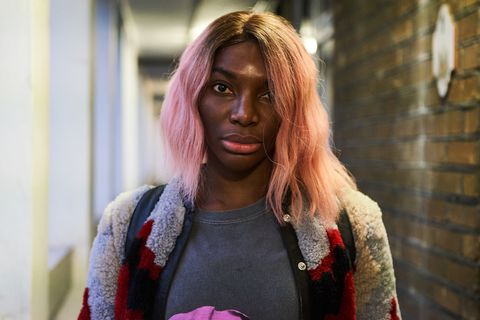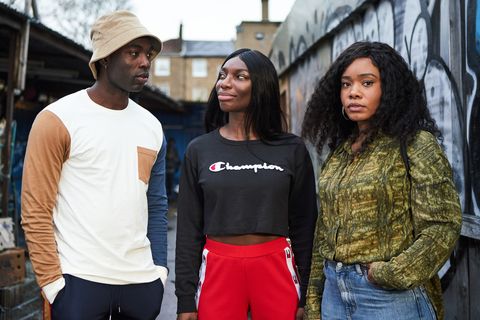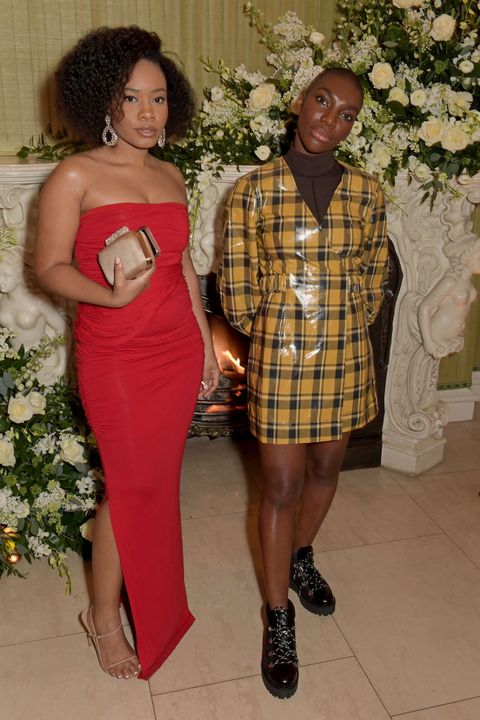By now, you probably already know that Michaela Coel wrote all twelve episodes of I May Destroy You’s first season. She also co-directed nine episodes of the series. You already know she had to fight with the likes of CAA and Netflix to make the show on her terms, even after creating the hit show Chewing Gum. With I May Destroy You, the world has finally rushed to recognize Coel’s genius, but she’s not letting it phase her. “You can’t really engage with that,” she says over Zoom. “I might as well do what I’ve been doing every day, which is sitting down.”
When I May Destroy You debuted in June, it was greeted with immediate praise. It is, undoubtedly, one of the best new shows of the year, unflinching in the way it reimagines narratives for victims of sexual assault on television. It also refuses to let its central assault define the entirety of the series, and Coel’s intuition and genius is the driving force behind the show’s ability to thrive within ever-shifting perspectives. Traditionally, sexual assault narratives have focused on victimhood in isolation, but Coel explores more complex definitions of “victim” and “assault” that showcase just how communal these experiences actually are.
At the same time, it’s also one of HBO’s funniest new shows. Arabella (Coel) and her friends Terry (Weruche Opia) and Kwame (Paapa Essiedu) experience moments of joy, and the series’ third episode, “Don’t Forget the Sea,” epitomizes the show’s tone, careening between horror and hilarity as Terry wanders the streets of Italy alone and Arabella dances on tables at a club.
Coel remains gracious and grounded while balancing the burdens, obstacles, and responsibilities Black female trailblazers endure. As frustrating as that process can be, “it also strengthens you, it strengthens your knowledge of your show,” she explains. That strength is evident in the show’s finer details—the sound story, its characters’ wardrobe choices, the careful lighting—which create a story that is more intimate and raw than anything else on television. I May Destroy You is a dense work to unpack.
Coel—creator, writer, co-director and lead of I May Destroy You—speaks with ELLE.com about symbolism, the show’s global Black kinship, and the rush of recognition in the age of social media.
I want to ask about trigger warnings. A lot of online discussions about the show wonder why there aren’t trigger warnings for every episode.
I definitely now understand that people may need trigger warnings even when there is no sexual content. With the first episode, because Arabella isn’t in the flashback, we didn’t think it would need a trigger warning. But I had a couple of texts from friends like, “Why wasn’t there a trigger warning?” For content like this, even when it isn’t sexual, or we don’t really see anything violent occurring to somebody, people may need a trigger warning. That’s understandable. I think it’s beyond sexual assault. There are difficult themes in the show. I don’t know what the answer is! Is it that if there’s a trigger warning, people would choose not to watch?
Some viewers feel the hardest part is carrying the weight of the show from week to week. I’ve been telling people, if you can’t handle it, wait for it all to come out.
I completely agree. I think that’s smart. I became scared when the Coronavirus happened and when George Floyd was murdered. I suddenly thought, the content of the show is a lot to come at this time. I really started freaking out because I didn’t know we would be in this place psychologically. Being on lockdown is not helping how we engage with the show. I was worried about how it would be received, whether we were ready for it. And I think it is a lot to carry, but also it is life.
The show can be watched on any sort of timeline. You can start, you can stop. There are episodes when you take a step back. The pacing isn’t rushed. It mirrors the healing process that way.
I’m always aware that going into your past can inform how you see your present and how you can dictate your future. Going off on a tangent somewhere else seems random but really isn’t. Italy seems random. Like, why is she bringing up having a threesome in episode 2? It’s confusing. But then, eventually, we get it.
Throughout the show you play with the audience’s expectations in ways that haven’t been seen on TV before. Now, this is seen as genius, but it hasn’t always been easy for you. What is it like to finally get this recognition?
I try not to think about it too much. It’s just an idea or a belief. You can’t really engage with that. It’s not real. So, I can’t take it on. It’s better that I leave it over there because, if that was true, then what now? I might as well do what I’ve been doing every day, which is sitting down. I’ve bought a plant. I’m trying to be like Suzi and get into plants. That was probably my favorite scene to write. I loved the dynamic between Suzi and Arabella.
It plays with the idea of Black solidarity. I May Destroy You is about a global Black experience. We see that in the haircare scene. That’s such an intimate part of the Black healing experience. We haven’t even seen Issa get her hair done on Insecure yet!
I watched season 3 and I’m halfway through 4 of Insecure in the last month, and the parallels that I found blew my mind, you know? I was texting her [Issa] like, “Yo, what the fuck? You used Tierra Whack in the second episode! I use Tierra Whack in the second episode!” It blew my mind! I’m always tripping out about it. And Issa is always like, “Yeah, Michaela, we have a kinship, like, chill.” It’s crazy. It’s Black, it’s a Black thing.
Seeing her get her hair done, the music, your friendship with Terry—all of that is quintessential Black girl friendship. The show isn’t just about sexual assault.
It’s impossible to really pin it down as one thing. It’s about friendship. It’s also about race. It’s also about consent, but it’s also about being an individual and being away from your tribe. Whether it be your race, your gender, your economic background.
You and Weruche Opia didn’t really know each other prior to the show. How did you build that friendship so quickly?
When I saw her tape, I was with my housemates and we were all just like, “It’s her.” There’s something very captivating about her. She always talks about that fucking audition when I was staring at her sort of goofy-eyed, because I was! I had basically become a fan and couldn’t show that because she had to audition, but there was something instantly there that I can’t explain. That’s the nature of friendship, isn’t it?
Did you ever get tired of explaining your ideas before everyone saw your brilliance?
I was lucky with the team I assembled for this show. I never got tired of explaining because I wanted people to understand. This story was so in my belly and in my heart and in my mind, it overwhelmed me. I remember reaching a point where it was like, “Michaela, come in, we’ll spend the day, explain it to us.” And by the end of that day, their faces were just lit up. They said, “We get it now. Nothing you write is by mistake.” And I’m like, “Yeah!” If you can get to that point with your team, the journey is fucking awesome. But you have to explain yourself to get there. But it also strengthens you, it strengthens your knowledge of your show.
Everything in the show feels so intentional! I have this theory about the use of cardigans. Tell me if I sound like a conspiracy theorist: She’s wearing a cardigan when she’s assaulted. She wears one when she’s calling out Zain. In the Halloween episode, she changes and has bare shoulders. The cardigan was also one of the main items the police took from her apartment.
Hugely symbolic. There’s nothing that’s just random. She also wears the cardigan again at the end, when she’s reading her book. And in episode 9, Tabby is trying to get her to wear her cardigan. I have to give credit to the costume [designer]. That’s Lynsey Moore, whose only job is to create a narrative and create symbols through costume. That narrative is built between me and her. And it blew my mind, her ideas and her way of sort of sneaking in the story through costumes. She did Chewing Gum too, both seasons.
You explore hero syndrome with Arabella. She tries to speak up for other women, but she gets overwhelmed. When we force this role on Black women, it can break us.
I stay away from branding myself as some sort of hero, because I think it can lead you into trouble. I like to do what I can. If I can make a show, it doesn’t strain me to create 268 jobs. If I do this the best I can, as what has happened with the BBC—they’ve just pledged a hundred million to the work of Black and Asian minority people and they used Arabella to announce this—then I’ve contributed to what’s happening here and it’s not breaking my back. The opportunity may rise, where I can safely do something different, but I think sometimes just having good intentions can cause catastrophic consequences. So I’m very careful. I’m very mindful.
Arabella is very much online, but you’re not. Is that part of your mindfulness?
I used to be online a lot. [The show is] definitely inspired by my journey with social media. I think in many ways, social media is great. I just think we need to learn how to use it whilst avoiding the severe detrimental effects it has on mental health. How can we use this drug sensibly? Because it is a drug and with every drug you need to moderate it. I couldn’t write the show whilst engaging on Twitter the way that I was engaging. I had to leave because I had to finish my show.
How does Arabella protect herself from social media? People try to diagnose her. Others turn her into a hero when she isn’t ready to be one.
It’s a lot to take on. When you are an influencer or somebody with a lot of followers, people online like you, but they don’t actually know you. They’ve decided you are a particular kind of person and they choose to like it. You can take on so much of that praise that you flatten yourself and begin to know the version that they know, which is not the fullness of you. It’s this version the virtual world creates. I am always encouraging breaks. I think Arabella can take breaks and also be loud. She can disappear for a hot minute and come back.
I May Destroy You airs Mondays at 9 p.m. EST on HBO.
This interview has been edited and condensed for clarity.
This content is created and maintained by a third party, and imported onto this page to help users provide their email addresses. You may be able to find more information about this and similar content at piano.io


